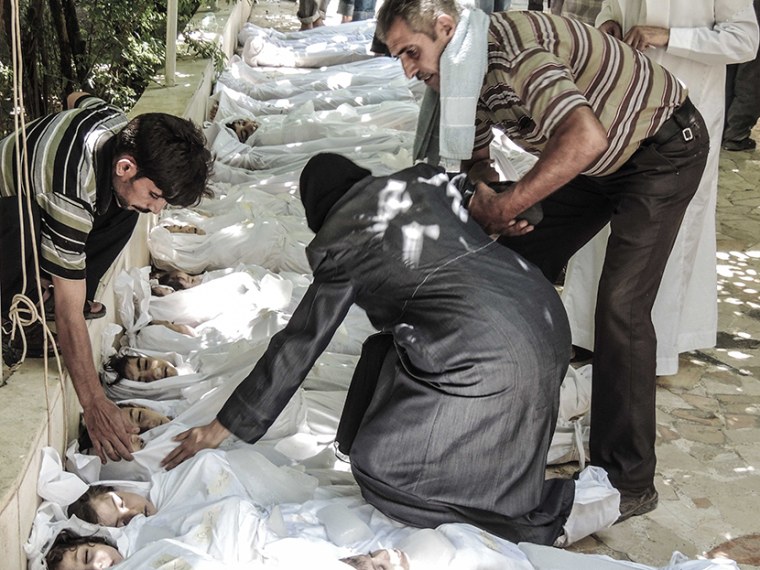Given what Secretary of State John Kerry called "undeniable" evidence that the Syrian regime used chemical weapons against its own citizens, "there has to be a response" from the United States, said White House spokesman Jay Carney. Carney said the public will hear the decision as soon as President Obama has made it, and he emphasized that all options are open--except boots on the ground.
In his hard-line remarks at the State Department, Kerry called the attack "inexcusable" and "a moral obscenity."
Kerry accused Bashar al-Assad of the “indiscriminate slaughter of civilians” and of attempting to cover up its “cowardly crime.”
“Make no mistake, President Obama believes there must be accountability for those who would use the world’s most heinous weapons against the world’s most vulnerable people,” Kerry said. Even as UN inspectors continued to gather evidence in Syria, Kerry said the U.S. government had gathered its own proof and was sharing it with allies.
He said Obama was actively consulting with other world leaders and Congress. Kerry said the administration would "make an informed decision" about its response to the use of chemical weapons--an international violation--in the next few days.
Andrea Mitchell reports that the intelligence community is preparing a release--perhaps for as early as Tuesday--to lay out the administration's case that the chemical attack was launched by the regime. Officials told Mitchell that a military attack was not inevitable (in the unlikely event that Russia changed allegiances or that Damascus admitted responsibility), and in any case not imminent. The White House wants to explain the intelligence to the public, to work with allies including the UN and NATO, and to allow Kerry time to build support from the Arab League.
John Boehner released a statement saying he had "preliminary communication with the White House about the situation in Syria and any potential U.S. response. The Speaker made clear that before any action is taken there must be meaningful consultation with members of Congress, as well as clearly defined objectives and a broader strategy to achieve stability."
Kerry spoke passionately about the human suffering "we can never ignore or forget." In the last 24 hours Kerry said he had watched videos "one more gut-wrenching time" of men, women, and children attacked and grieving. He noted an especially searing image of a man holding his dead child.
Obama met with his national security team Saturday as he continued to weigh the U.S. response to the reports of chemical weapon use and the ongoing Syrian civil war in which the death toll has risen above 100,000. Obama had previously said the use of chemical weapons would represent a "red line" in the Syrian conflict, but never specified what action would follow the crossing of that red line.
“We have a range of options available, and we are going to act very deliberately so that we’re making decisions consistent with our national interest as well as our assessment of what can advance our objectives in Syria,” a White House statement said Saturday.
Earlier this year, Obama agreed to supply the Syrian rebel forces with limited small arms.
Syrian Information Minister Omran Zoabi warned the U.S. not to intervene, saying “U.S. military intervention will create a very serious fallout and a ball of fire that will inflame the Middle East,” according to Reuters which quoted state news agency SANA.
United Nations chemical weapons investigators said Monday that they were shot at while en route to inspect the site where chemical weapons were suspected of being used Aug. 21 in the killing of hundreds of civilians.
An "unknown sniper" shot at one of the U.N. vehicles multiple times, UN Secretary General Ban Ki-moon said Monday. The UN team was able to review the site, located in a suburb of the Syrian capital of Damascus, after replacing the damaged vehicle. They collected samples and interviewed witnesses, including survivors, and doctors during their first day of inspection.
The UN condemned the incident and said it would register “a strong complaint to the Syrian Government and authorities of opposition forces so that this will never happen and the safety and security of the investigation teams will be secured from tomorrow.”
Kerry said the incident "further weakens the regime's credibility."
The Syrian government agreed to allow U.N. inspectors in on Sunday after U.N. pressure to do so. The White House immediately called it "too late to be credible."
"If the Syrian government had nothing to hide and wanted to prove to the world that it had not used chemical weapons in this incident it would have ceased its attacks on the area and granted immediate access to the UN - five days ago," read a statement attributed to a White House official Sunday.
